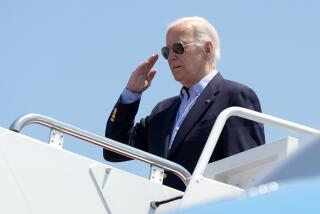Search for Next Panchen Lama Pits Tibet Against China’s Communists : Religion: The party claims the right to approve the reincarnated successor of Tibet’s second-highest spiritual leader, who died last year.
China’s Communist leaders and Tibetan Buddhists are once more in conflict, this time over the mystical search for a revered incarnation of a Buddhist deity.
Officially an atheistic body, the Communist Party claims the right to approve the reincarnated successor of the Panchen Lama, Tibet’s second-highest spiritual leader, who died last year.
After his death, the Panchen Lama’s body was gilded in gold and enthroned in a shrine in Tashi Lhunpo monastery, in a remote high river valley.
His painted lips smile and his painted eyes watch over pilgrims and peasants who flock to mourn at the temple in Shigatse, Tibet’s second most important religious center.
Fifty monks sit in parallel rows below his throne, meditating on 50 identical pictures of the lama while reciting prayers for his reincarnation.
A complex historical figure, the Panchen Lama had been China’s main spokesman for its policies on Tibet and an intermediary between Beijing and the Dalai Lama, Tibet’s exiled god-king.
Tibetans believe the Panchen Lama, who died in January, 1989, was the 10th incarnation of Amitabha, a Buddhist deity who takes human form to lead followers toward enlightenment.
Like all high lamas, or monks, he is believed to be able to choose the time and place of his next incarnation.
But last August, Chinese Premier Li Peng ordered that the search for the 11th Panchen Lama must take place within Chinese borders, conducted by a government-organized committee in accordance with China’s constitution and approved by the State Council.
Buddhist clergy in Tibet, India and Japan denounced the order as state intrusion into an intimately religious matter.
“Unless Deng Xiaoping and his friends become Buddhist, the search for the next Panchen Lama is none of their business. This is a religious affair, not a political vacancy,” said Pema Gyalpo, the Dalai Lama’s representative in Tokyo.
According to centuries-old Tibetan custom, senior monks from the Tashi Lhunpo monastery should conduct the search in consultation with high lamas throughout the region and under the leadership of the Dalai Lama.
Control over the search has become a major issue in the long-running battle between Beijing and the Dalai Lama over the direction of Tibet’s religious and political future.
China says it has held sovereignty over Tibet since the 13th Century. It sent the People’s Liberation Army into the Himalayan region in 1950 to enforce its claim. Full-fledged Communist rule began after an anti-Chinese uprising in 1959.
“Traditionally, the responsibility of the recognition and selection of the Dalai Lama or Panchen Lama lies entirely on either of the two who is alive at that time,” the Dalai Lama said in an interview in the Indian newspaper Hindustan Times a year ago. “So now the Panchen Lama’s reincarnation is my responsibility.”
This bond between the two incarnate gods dates back to the 17th Century. But Chinese leaders have tried over the centuries to create a schism between the two lamas, or to influence their selection, to gain a political foothold in Tibet.
China’s former Nationalist government influenced the selection of the 10th Panchen Lama, who came under control of Communist authorities in 1949 when he was 11 years old.
When the Dalai Lama fled to India after the abortive 1959 uprising, the Panchen Lama joined Tibet’s new socialist government. But in 1964, he unexpectedly praised the Dalai Lama at a mass rally and called for Tibetan independence.
The Panchen Lama was jailed and tortured in Beijing over the next decade while religious practices in Tibet were forcibly suppressed during the radical Cultural Revolution.
Despite his three decades of exile, the Dalai Lama remains deeply revered in Tibet. Many monks say Tibetans will recognize only an incarnation of the Panchen Lama endorsed by him.
Monks interviewed recently at Tashi Lhunpo said their search committee would consult myriad esoteric markers in the quest for the reborn Panchen Lama.
Tibet’s state oracles, the mediums of the gods, will be asked for guidance. Auspicious signs will be sought in the skies and in the waters of the Lhamo Lhatso, a sacred Tibetan lake thought to be a mirror of divine will.
Under Tibetan tradition, these signs must be interpreted by the Dalai Lama. However, when martial law was imposed last March in Lhasa, the capital, after pro-independence protests, Beijing banned contacts between Tashi Lhunpo and the Dalai Lama.
“If the Tashi Lhunpo committee is not allowed to travel outside of Tibet, or, if the Chinese government usurps the committee’s functions, the Tibetan government-in-exile will organize its own search party and search both within and beyond Tibet,” said Tashi Wangdi, the Dalai Lama’s representative in New Delhi.
The Panchen Lama was released from prison in the late 1970s and appointed to the National People’s Congress, China’s nominal parliament. He supported the official policy of granting Tibetans limited religious freedom but not political autonomy.
He was still respected by most Tibetans, but some pro-independence monks branded him a Chinese collaborator.
Largely confined to Beijing, the Panchen Lama made his last pilgrimage to Tibet in January, 1989. He said in a speech to party and military leaders that the benefits of three decades of Communist rule in Tibet had been outweighed by the price paid.
He died five days later at the age of 50 from a heart attack, official reports said. Rumors spread in Tibet that he had been poisoned, but there is no evidence to support this.
More to Read
Sign up for Essential California
The most important California stories and recommendations in your inbox every morning.
You may occasionally receive promotional content from the Los Angeles Times.






